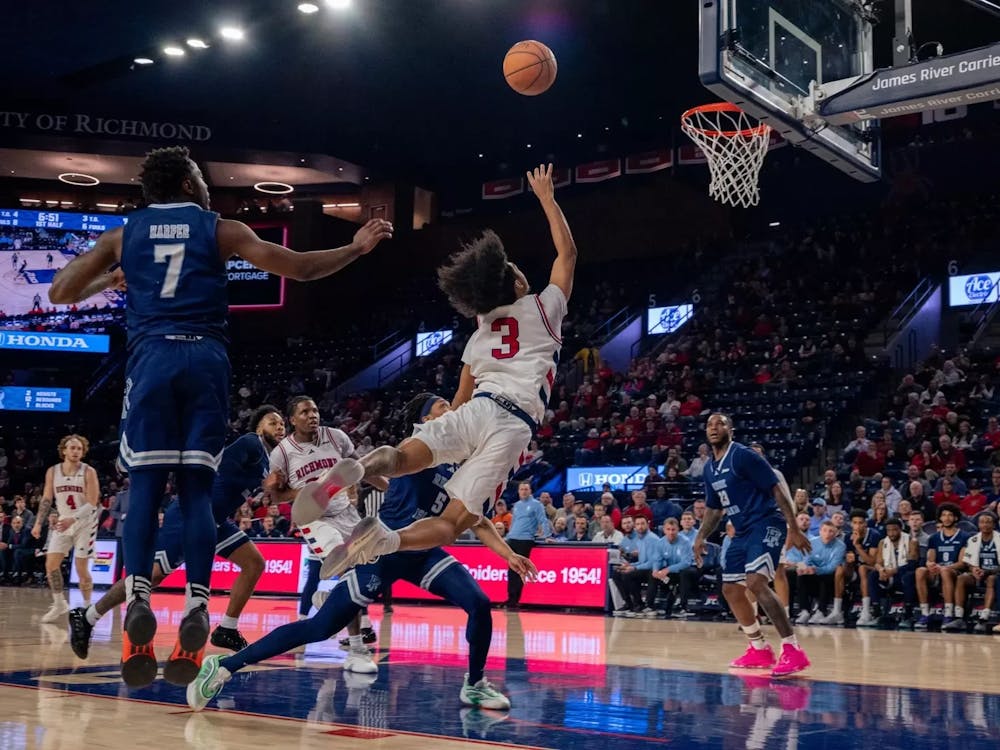Skipped class this morning? Not only does your professor know, University of Richmond might know, too.
With technologies such as Blackboard, GradTracker and student ID cards, student locations, study habits and other engagements are noted and can be tracked. Although Richmond faculty and staff members said no one was deliberately stalking students, these processes are executed for a targeted reason: to watch students and ensure steady and positive paths towards graduation – even if that induces a bit of a creep-factor.
“We can see if you open documents if we set it that way,” professor Donelson Forsyth said regarding Blackboard.
This setting, called track-statistics, can also run a specific program that shows when and what time the document was opened as well as how many times it was re-opened. A column in the grading section – the version seen only by the professor – also shows when Blackboard was last accessed by students.
“I can see if students opened something at the last minute or the very first day,” Forsyth said. He conducted his own mini study using this data to discover the secret to earning good grades.
“Students who got the worst grades were logging in to Blackboard a little bit after midnight, and the students who got the best grades were logging in around eight in the morning,” he said.
These findings cannot be published because of consent reasons, which engenders another array of “big brother-esque” problems.
Much of this tracking is not approved by the school’s institutional review board (IRB), because what the administration uses for internal purposes isn’t considered science, said members of the IRB. Campus climate surveys, for example, the ones constantly popping up in student inboxes, are out of the reach of the ethics-upholding committee.
However, such monitoring aids the university in pinpointing students who are “at-risk.”
“Professors can set up Blackboard in a way that if students aren’t doing certain things, like opening assignments, it will send a warning email to the professor, signaling a student is at-risk,” Forsyth said.
The dean’s offices enforce a similar alert system, through a software called Maxient. Maxient, which is advertised as a ‘student conduct software,’ has a number of features such as student-staff email and text alerts, student demographic tracking and online incident reporting.
The deans are dependent on faculty submitting incident reports for students of concern, Dean Juliette Landphair said. Academic advisors are also privy to these reports because they too “should have a feel for how a student is performing,” she said.
Enjoy what you're reading?
Signup for our newsletter
Aside from academics, life beyond the classroom is subject to tracking.
One Card Services maintains a record of each student’s ID card, or “swipe” as they are more commonly referred to, and can see not only when the student enters the dining hall or uses dining dollars, but also what dorms and buildings they swipe into and at what time.
The information is primarily used for security purposes only, said Randy Moran, director of business administration for campus services. The Family Educational Rights Privacy Act restricts most of the data from being shared unless it’s with the police. But, if an administrator or a professor wonders why a student hasn’t been showing up to class, One Card can note if the student has been using his/her meal plan or has been swiping into other campus events.
The business and leadership schools request that students swipe in to many of its events in an effort to track attendance. Francine Reynolds, manager of One Card Services, said she worked with both parties frequently, printing out or emailing a list of attendees to administrators after an event.
As students capable of texting, walking and sipping coffee all at once, this technology, data collection and tracking shouldn’t come as much of a surprise. Some education-technology firms believe even more should be done in the way of data mining, by using Facebook, Chegg and other frequently visited apps and sites. Since privacy issues and experience with technology are hurdles to be overcome, this vision may be far off, but definitely not impossible.
Yes, it’s a little disturbing that someone out there may know how much pizza you ordered on a Thursday night at 2 a.m., but if it means ensuring a student graduates in four years, is taking all the necessary courses to finish his/her major or that he/she is safe, then creep away, Richmond, creep away.
Contact Opinion Editor Stephanie Manley at stephanie.manley@richmond.edu
Support independent student media
You can make a tax-deductible donation by clicking the button below, which takes you to our secure PayPal account. The page is set up to receive contributions in whatever amount you designate. We look forward to using the money we raise to further our mission of providing honest and accurate information to students, faculty, staff, alumni and others in the general public.
Donate Now


